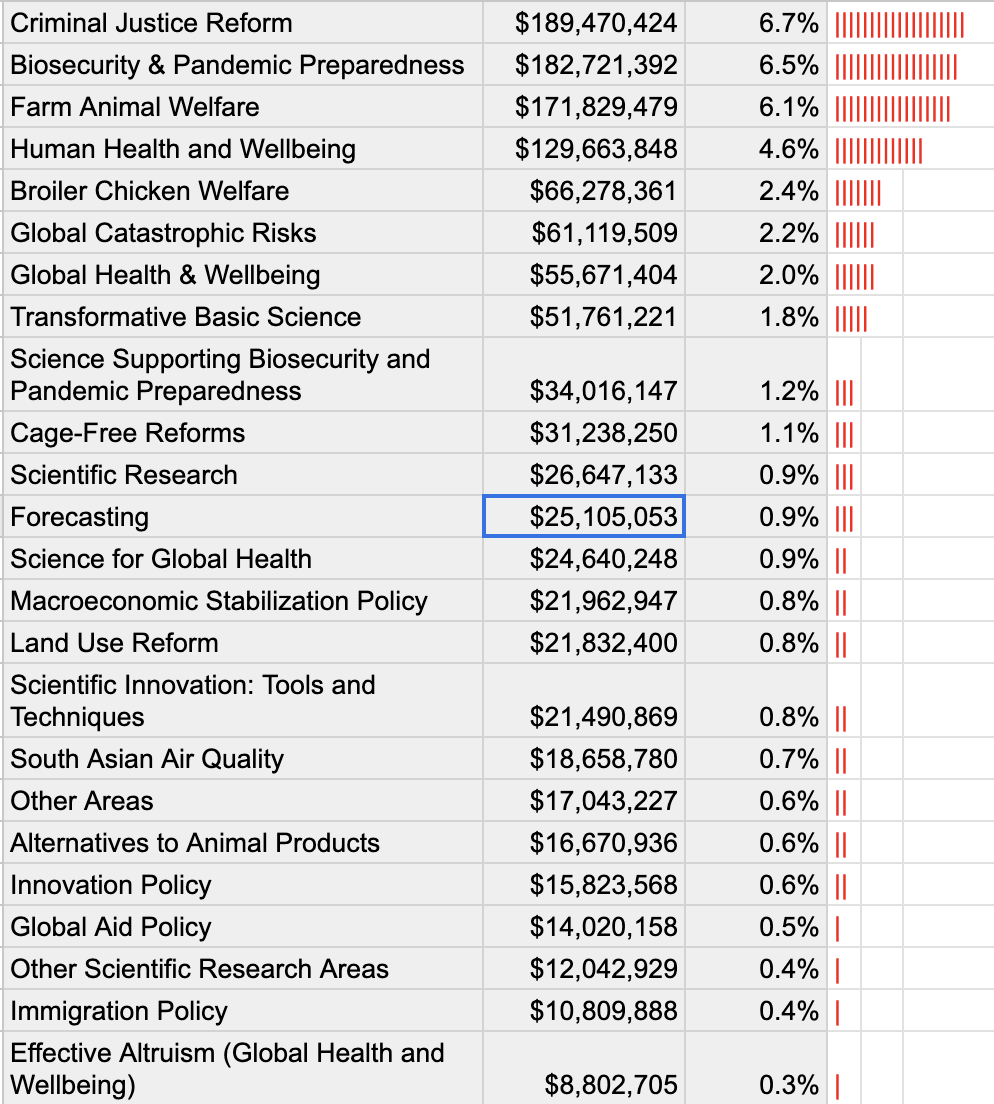Written by Benjamin Tereick
Edit: several comments here question the value of forecasting as a philanthropic cause — see this comment for a reply.
We are happy to announce that we have added forecasting as an official grantmaking focus area. As of January 2024, the forecasting team comprises two full-time employees: myself and Javier Prieto. In August 2023, I joined Open Phil to lead our forecasting grantmaking and internal processes. Prior to that, I worked on forecasts of existential risk and the long-term future at the Global Priorities Institute. Javier recently joined the forecasting team in a full-time capacity from Luke Muehlhauser’s AI governance team, which was previously responsible for our forecasting grantmaking.
While we are just now launching a dedicated cause area, Open Phil has long endorsed forecasting as an important way of improving the epistemic foundations of our decisions and the decisions of others. We have made several grants to support the forecasting community in the last few years, e.g., to Metaculus, the Forecasting Research Institute, and ARLIS. Moreover, since the launch of Open Phil, grantmakers have often made predictions about core outcomes for grants they approve.
Now with increased staff capacity, the forecasting team wants to build on this work. Our main goal is to help realize the promise of forecasting as a way to improve high-stakes decisions, as outlined in our focus area description. We are excited both about projects aiming to increase the adoption rate of forecasting as a tool by relevant decision-makers, and about projects that provide accurate forecasts on questions that could plausibly influence the choices of these decision-makers. We are interested in such work across both of our portfolios: Global Health and Wellbeing and Global Catastrophic Risks. [1]
We are as of yet uncertain about the most promising type of project in the forecasting focus area, and we will likely fund a variety of different approaches. We will also continue our commitment to forecasting research and to the general support of the forecasting community, as we consider both to be prerequisites for high-impact forecasting. Supported by other Open Phil researchers, we plan to continue exploring the most plausible theories of change for forecasting. I aim to regularly update the forecasting community on the development of our thinking.
Besides grantmaking, the forecasting team is also responsible for Open Phil’s internal forecasting processes, and for managing forecasting services for Open Phil staff. This part of our work will be less public, but we will occasionally publish insights from our own processes, like Javier’s 2022 report on the accuracy of our internal forecasts.
- ^
It should be noted that administratively, the forecasting team is part of the Global Catastrophic Risks portfolio, and historically, our forecasting work has had closer links to that part of the organization.


I'm considering elaborating on this in a full post, but I will do so quickly here as well: It appears to me that there's potentially a misunderstanding here, leading to unnecessary disagreement.
I think that the nature of forecasting in the context of decision-making within governments and other large institutions is very different from what is typically seen on platforms like Manifold, PolyMarket, or even Metaculus. I agree that these platforms often treat forecasting more as a game or hobby, which is fine, but very different from the kind of questions policymakers want to see answered.
I (and I hope this aligns with OP's vision) would want to see a greater emphasis on advancing forecasting specifically tailored for decision-makers. This focus diverges significantly from the casual or hobbyist approach observed on these platforms. The questions you ask should probably not be public, and they are usually far more boring. In practice, it looks more like an advanced Delphi method than it looks like Manifold Markets. I'm somewhat surprised to see interpretations of this post suggesting a need for more funding in the type of forecasting that is more recreational, which, in my view, is and should not be a priority.
E: One obvious exemption to the dichotomy I describe above is that the more fun forecasting platforms can be a good way of identifying
Superforecastersgood forecasters.